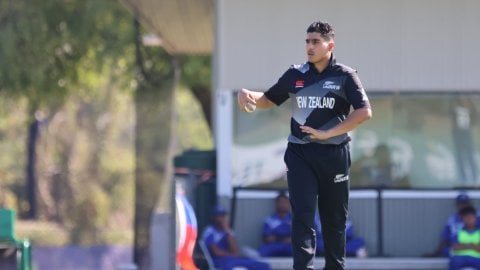
The Event Technical Committee: New Zealand leg-spinner Rahman Hekmat has been withdrawn from the side’s squad for the upcoming U19 Men’s World Cup in South Africa due to a lumbar bone stress injury sustained during training.
New Zealand Cricket (NZC) said allrounder Robbie Foulkes has been called into the squad as Hekmat’s replacement and will fly to South Africa on Friday, a move which has been approved by the Event Technical Committee of the tournament.
The replacement of a player requires the approval of the Event Technical Committee before the player can be officially added to the squad. The Event Technical Committee of the ICC U19 Men’s Cricket World Cup 2024 consists of Wasim Khan (ICC General Manager – Cricket and Chair of the ETC), Wanele Mngomezulu (Host Tournament Director), Sarah Edgar (IBC Representative) and Samuel Badree (Independent Representative).

